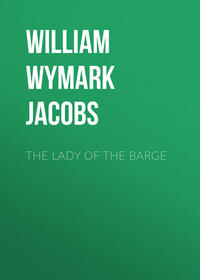 полная версия
полная версияOdd Craft, Complete

W. W. Jacobs
Odd Craft, Complete
THE MONEY-BOX
Sailormen are not good ‘ands at saving money as a rule, said the night-watchman, as he wistfully toyed with a bad shilling on his watch-chain, though to ‘ear ‘em talk of saving when they’re at sea and there isn’t a pub within a thousand miles of ‘em, you might think different.
It ain’t for the want of trying either with some of ‘em, and I’ve known men do all sorts o’ things as soon as they was paid off, with a view to saving. I knew one man as used to keep all but a shilling or two in a belt next to ‘is skin so that he couldn’t get at it easy, but it was all no good. He was always running short in the most inconvenient places. I’ve seen ‘im wriggle for five minutes right off, with a tramcar conductor standing over ‘im and the other people in the tram reading their papers with one eye and watching him with the other.
Ginger Dick and Peter Russet—two men I’ve spoke of to you afore—tried to save their money once. They’d got so sick and tired of spending it all in p’r’aps a week or ten days arter coming ashore, and ‘aving to go to sea agin sooner than they ‘ad intended, that they determined some way or other to ‘ave things different.
They was homeward bound on a steamer from Melbourne when they made their minds up; and Isaac Lunn, the oldest fireman aboard—a very steady old teetotaler—gave them a lot of good advice about it. They all wanted to rejoin the ship when she sailed agin, and ‘e offered to take a room ashore with them and mind their money, giving ‘em what ‘e called a moderate amount each day.
They would ha’ laughed at any other man, but they knew that old Isaac was as honest as could be and that their money would be safe with ‘im, and at last, after a lot of palaver, they wrote out a paper saying as they were willing for ‘im to ‘ave their money and give it to ‘em bit by bit, till they went to sea agin.
Anybody but Ginger Dick and Peter Russet or a fool would ha’ known better than to do such a thing, but old Isaac ‘ad got such a oily tongue and seemed so fair-minded about wot ‘e called moderate drinking that they never thought wot they was letting themselves in for, and when they took their pay—close on sixteen pounds each—they put the odd change in their pockets and ‘anded the rest over to him.
The first day they was as pleased as Punch. Old Isaac got a nice, respectable bedroom for them all, and arter they’d ‘ad a few drinks they humoured ‘im by ‘aving a nice ‘ot cup o’ tea, and then goin’ off with ‘im to see a magic-lantern performance.
It was called “The Drunkard’s Downfall,” and it begun with a young man going into a nice-looking pub and being served by a nice-looking barmaid with a glass of ale. Then it got on to ‘arf pints and pints in the next picture, and arter Ginger ‘ad seen the lost young man put away six pints in about ‘arf a minute, ‘e got such a raging thirst on ‘im that ‘e couldn’t sit still, and ‘e whispered to Peter Russet to go out with ‘im.
“You’ll lose the best of it if you go now,” ses old Isaac, in a whisper; “in the next picture there’s little frogs and devils sitting on the edge of the pot as ‘e goes to drink.”
“Ginger Dick got up and nodded to Peter.”
“Arter that ‘e kills ‘is mother with a razor,” ses old Isaac, pleading with ‘im and ‘olding on to ‘is coat.
Ginger Dick sat down agin, and when the murder was over ‘e said it made ‘im feel faint, and ‘im and Peter Russet went out for a breath of fresh air. They ‘ad three at the first place, and then they moved on to another and forgot all about Isaac and the dissolving views until ten o’clock, when Ginger, who ‘ad been very liberal to some friends ‘e’d made in a pub, found ‘e’d spent ‘is last penny.
“This comes o’ listening to a parcel o’ teetotalers,” ‘e ses, very cross, when ‘e found that Peter ‘ad spent all ‘is money too. “Here we are just beginning the evening and not a farthing in our pockets.”
They went off ‘ome in a very bad temper. Old Isaac was asleep in ‘is bed, and when they woke ‘im up and said that they was going to take charge of their money themselves ‘e kept dropping off to sleep agin and snoring that ‘ard they could scarcely hear themselves speak. Then Peter tipped Ginger a wink and pointed to Isaac’s trousers, which were ‘anging over the foot of the bed.
Ginger Dick smiled and took ‘em up softly, and Peter Russet smiled too; but ‘e wasn’t best pleased to see old Isaac a-smiling in ‘is sleep, as though ‘e was ‘aving amusing dreams. All Ginger found was a ha’-penny, a bunch o’ keys, and a cough lozenge. In the coat and waistcoat ‘e found a few tracks folded up, a broken pen-knife, a ball of string, and some other rubbish. Then ‘e set down on the foot o’ their bed and made eyes over at Peter.
“Wake ‘im up agin,” ses Peter, in a temper.
Ginger Dick got up and, leaning over the bed, took old Isaac by the shoulders and shook ‘im as if ‘e’d been a bottle o’ medicine.
“Time to get up, lads?” ses old Isaac, putting one leg out o’ bed.
“No, it ain’t,” ses Ginger, very rough; “we ain’t been to bed yet. We want our money back.”
Isaac drew ‘is leg back into bed agin. “Goo’ night,” he ses, and fell fast asleep.
“He’s shamming, that’s wot ‘e is,” ses Peter Russet. “Let’s look for it. It must be in the room somewhere.”
They turned the room upside down pretty near, and then Ginger Dick struck a match and looked up the chimney, but all ‘e found was that it ‘adn’t been swept for about twenty years, and wot with temper and soot ‘e looked so frightful that Peter was arf afraid of ‘im.
“I’ve ‘ad enough of this,” ses Ginger, running up to the bed and ‘olding his sooty fist under old Isaac’s nose. “Now, then, where’s that money? If you don’t give us our money, our ‘ard-earned money, inside o’ two minutes, I’ll break every bone in your body.”
“This is wot comes o’ trying to do you a favour, Ginger,” ses the old man, reproachfully.
“Don’t talk to me,” ses Ginger, “cos I won’t have it. Come on; where is it?”
Old Isaac looked at ‘im, and then he gave a sigh and got up and put on ‘is boots and ‘is trousers.
“I thought I should ‘ave a little trouble with you,” he ses, slowly, “but I was prepared for that.”
“You’ll ‘ave more if you don’t hurry up,” ses Ginger, glaring at ‘im.
“We don’t want to ‘urt you, Isaac,” ses Peter Russet, “we on’y want our money.”
“I know that,” ses Isaac; “you keep still, Peter, and see fair-play, and I’ll knock you silly arterwards.”
He pushed some o’ the things into a corner and then ‘e spat on ‘is ‘ands, and began to prance up and down, and duck ‘is ‘ead about and hit the air in a way that surprised ‘em.
“I ain’t hit a man for five years,” ‘e ses, still dancing up and down— “fighting’s sinful except in a good cause—but afore I got a new ‘art, Ginger, I’d lick three men like you afore breakfast, just to git up a appetite.”
“Look, ‘ere,” ses Ginger; “you’re an old man and I don’t want to ‘urt you; tell us where our money is, our ‘ard-earned money, and I won’t lay a finger on you.”
“I’m taking care of it for you,” ses the old man.
Ginger Dick gave a howl and rushed at him, and the next moment Isaac’s fist shot out and give ‘im a drive that sent ‘im spinning across the room until ‘e fell in a heap in the fireplace. It was like a kick from a ‘orse, and Peter looked very serious as ‘e picked ‘im up and dusted ‘im down.
“You should keep your eye on ‘is fist,” he ses, sharply.
It was a silly thing to say, seeing that that was just wot ‘ad ‘appened, and Ginger told ‘im wot ‘e’d do for ‘im when ‘e’d finished with Isaac. He went at the old man agin, but ‘e never ‘ad a chance, and in about three minutes ‘e was very glad to let Peter ‘elp ‘im into bed.
“It’s your turn to fight him now, Peter,” he ses. “Just move this piller so as I can see.”
“Come on, lad,” ses the old man.
Peter shook ‘is ‘ead. “I have no wish to ‘urt you, Isaac,” he ses, kindly; “excitement like fighting is dangerous for an old man. Give us our money and we’ll say no more about it.”
“No, my lads,” ses Isaac. “I’ve undertook to take charge o’ this money and I’m going to do it; and I ‘ope that when we all sign on aboard the Planet there’ll be a matter o’ twelve pounds each left. Now, I don’t want to be ‘arsh with you, but I’m going back to bed, and if I ‘ave to get up and dress agin you’ll wish yourselves dead.”
He went back to bed agin, and Peter, taking no notice of Ginger Dick, who kept calling ‘im a coward, got into bed alongside of Ginger and fell fast asleep.
They all ‘ad breakfast in a coffee-shop next morning, and arter it was over Ginger, who ‘adn’t spoke a word till then, said that ‘e and Peter Russet wanted a little money to go on with. He said they preferred to get their meals alone, as Isaac’s face took their appetite away.
“Very good,” ses the old man. “I don’t want to force my company on nobody,” and after thinking ‘ard for a minute or two he put ‘is ‘and in ‘is trouser-pocket and gave them eighteen-pence each.
“That’s your day’s allowance,” ses Isaac, “and it’s plenty. There’s ninepence for your dinner, fourpence for your tea, and twopence for a crust o’ bread and cheese for supper. And if you must go and drown yourselves in beer, that leaves threepence each to go and do it with.”
Ginger tried to speak to ‘im, but ‘is feelings was too much for ‘im, and ‘e couldn’t. Then Peter Russet swallered something ‘e was going to say and asked old Isaac very perlite to make it a quid for ‘im because he was going down to Colchester to see ‘is mother, and ‘e didn’t want to go empty-’anded.
“You’re a good son, Peter,” ses old Isaac, “and I wish there was more like you. I’ll come down with you, if you like; I’ve got nothing to do.”
Peter said it was very kind of ‘im, but ‘e’d sooner go alone, owing to his mother being very shy afore strangers.
“Well, I’ll come down to the station and take a ticket for you,” ses Isaac.
Then Peter lost ‘is temper altogether, and banged ‘is fist on the table and smashed ‘arf the crockery. He asked Isaac whether ‘e thought ‘im and Ginger Dick was a couple o’ children, and ‘e said if ‘e didn’t give ‘em all their money right away ‘e’d give ‘im in charge to the first policeman they met.
“I’m afraid you didn’t intend for to go and see your mother, Peter,” ses the old man.
“Look ‘ere,” ses Peter, “are you going to give us that money?”
“Not if you went down on your bended knees,” ses the old man.
“Very good,” says Peter, getting up and walking outside; “then come along o’ me to find a police-man.”
“I’m agreeable,” ses Isaac, “but I’ve got the paper you signed.”
Peter said ‘e didn’t care twopence if ‘e’d got fifty papers, and they walked along looking for a police-man, which was a very unusual thing for them to do.
“I ‘ope for your sakes it won’t be the same police-man that you and Ginger Dick set on in Gun Alley the night afore you shipped on the Planet,” ses Isaac, pursing up ‘is lips.
“‘Tain’t likely to be,” ses Peter, beginning to wish ‘e ‘adn’t been so free with ‘is tongue.
“Still, if I tell ‘im, I dessay he’ll soon find ‘im,” ses Isaac; “there’s one coming along now, Peter; shall I stop ‘im?”
Peter Russet looked at ‘im and then he looked at Ginger, and they walked by grinding their teeth. They stuck to Isaac all day, trying to get their money out of ‘im, and the names they called ‘im was a surprise even to themselves. And at night they turned the room topsy-turvy agin looking for their money and ‘ad more unpleasantness when they wanted Isaac to get up and let ‘em search the bed.
They ‘ad breakfast together agin next morning and Ginger tried another tack. He spoke quite nice to Isaac, and ‘ad three large cups o’ tea to show ‘im ‘ow ‘e was beginning to like it, and when the old man gave ‘em their eighteen-pences ‘e smiled and said ‘e’d like a few shillings extra that day.
“It’ll be all right, Isaac,” he ses. “I wouldn’t ‘ave a drink if you asked me to. Don’t seem to care for it now. I was saying so to you on’y last night, wasn’t I, Peter?”
“You was,” ses Peter; “so was I.”
“Then I’ve done you good, Ginger,” ses Isaac, clapping ‘im on the back.
“You ‘ave,” ses Ginger, speaking between his teeth, “and I thank you for it. I don’t want drink; but I thought o’ going to a music-’all this evening.”
“Going to wot?” ses old Isaac, drawing ‘imself up and looking very shocked.
“A music-’all,” ses Ginger, trying to keep ‘is temper.
“A music-’all,” ses Isaac; “why, it’s worse than a pub, Ginger. I should be a very poor friend o’ yours if I let you go there—I couldn’t think of it.”
“Wot’s it got to do with you, you gray-whiskered serpent?” screams Ginger, arf mad with rage. “Why don’t you leave us alone? Why don’t you mind your own business? It’s our money.”
Isaac tried to talk to ‘im, but ‘e wouldn’t listen, and he made such a fuss that at last the coffee-shop keeper told ‘im to go outside. Peter follered ‘im out, and being very upset they went and spent their day’s allowance in the first hour, and then they walked about the streets quarrelling as to the death they’d like old Isaac to ‘ave when ‘is time came.
They went back to their lodgings at dinner-time; but there was no sign of the old man, and, being ‘ungry and thirsty, they took all their spare clothes to a pawnbroker and got enough money to go on with. Just to show their independence they went to two music-’ails, and with a sort of idea that they was doing Isaac a bad turn they spent every farthing afore they got ‘ome, and sat up in bed telling ‘im about the spree they’d ‘ad.
At five o’clock in the morning Peter woke up and saw, to ‘is surprise, that Ginger Dick was dressed and carefully folding up old Isaac’s clothes. At first ‘e thought that Ginger ‘ad gone mad, taking care of the old man’s things like that, but afore ‘e could speak Ginger noticed that ‘e was awake, and stepped over to ‘im and whispered to ‘im to dress without making a noise. Peter did as ‘e was told, and, more puzzled than ever, saw Ginger make up all the old man’s clothes in a bundle and creep out of the room on tiptoe.
“Going to ‘ide ‘is clothes?” ‘e ses.
“Yes,” ses Ginger, leading the way downstairs; “in a pawnshop. We’ll make the old man pay for to-day’s amusements.”
Then Peter see the joke and ‘e begun to laugh so ‘ard that Ginger ‘ad to threaten to knock ‘is head off to quiet ‘im. Ginger laughed ‘imself when they got outside, and at last, arter walking about till the shops opened, they got into a pawnbroker’s and put old Isaac’s clothes up for fifteen shillings.
First thing they did was to ‘ave a good breakfast, and after that they came out smiling all over and began to spend a ‘appy day. Ginger was in tip-top spirits and so was Peter, and the idea that old Isaac was in bed while they was drinking ‘is clothes pleased them more than anything. Twice that evening policemen spoke to Ginger for dancing on the pavement, and by the time the money was spent it took Peter all ‘is time to get ‘im ‘ome.
Old Isaac was in bed when they got there, and the temper ‘e was in was shocking; but Ginger sat on ‘is bed and smiled at ‘im as if ‘e was saying compliments to ‘im.
“Where’s my clothes?” ses the old man, shaking ‘is fist at the two of ‘em.
Ginger smiled at ‘im; then ‘e shut ‘is eyes and dropped off to sleep.
“Where’s my clothes?” ses Isaac, turning to Peter. “Closhe?” ses Peter, staring at ‘im.
“Where are they?” ses Isaac.
It was a long time afore Peter could understand wot ‘e meant, but as soon as ‘e did ‘e started to look for ‘em. Drink takes people in different ways, and the way it always took Peter was to make ‘im one o’ the most obliging men that ever lived. He spent arf the night crawling about on all fours looking for the clothes, and four or five times old Isaac woke up from dreams of earthquakes to find Peter ‘ad got jammed under ‘is bed, and was wondering what ‘ad ‘appened to ‘im.
None of ‘em was in the best o’ tempers when they woke up next morning, and Ginger ‘ad ‘ardly got ‘is eyes open before Isaac was asking ‘im about ‘is clothes agin.
“Don’t bother me about your clothes,” ses Ginger; “talk about something else for a change.”
“Where are they?” ses Isaac, sitting on the edge of ‘is bed.
Ginger yawned and felt in ‘is waistcoat pocket—for neither of ‘em ‘ad undressed—and then ‘e took the pawn-ticket out and threw it on the floor. Isaac picked it up, and then ‘e began to dance about the room as if ‘e’d gone mad.
“Do you mean to tell me you’ve pawned my clothes?” he shouts.
“Me and Peter did,” ses Ginger, sitting up in bed and getting ready for a row.
Isaac dropped on the bed agin all of a ‘cap. “And wot am I to do?” he ses.
“If you be’ave yourself,” ses Ginger, “and give us our money, me and Peter’ll go and get ‘em out agin. When we’ve ‘ad breakfast, that is. There’s no hurry.”
“But I ‘aven’t got the money,” ses Isaac; “it was all sewn up in the lining of the coat. I’ve on’y got about five shillings. You’ve made a nice mess of it, Ginger, you ‘ave.”
“You’re a silly fool, Ginger, that’s wot you are,” ses Peter.
“Sewn up in the lining of the coat?” ses Ginger, staring.
“The bank-notes was,” ses Isaac, “and three pounds in gold ‘idden in the cap. Did you pawn that too?”
Ginger got up in ‘is excitement and walked up and down the room. “We must go and get ‘em out at once,” he ses.
“And where’s the money to do it with?” ses Peter.
Ginger ‘adn’t thought of that, and it struck ‘im all of a heap. None of ‘em seemed to be able to think of a way of getting the other ten shillings wot was wanted, and Ginger was so upset that ‘e took no notice of the things Peter kept saying to ‘im.
“Let’s go and ask to see ‘em, and say we left a railway-ticket in the pocket,” ses Peter.
Isaac shook ‘is ‘ead. “There’s on’y one way to do it,” he ses. “We shall ‘ave to pawn your clothes, Ginger, to get mine out with.”
“That’s the on’y way, Ginger,” ses Peter, brightening up. “Now, wot’s the good o’ carrying on like that? It’s no worse for you to be without your clothes for a little while than it was for pore old Isaac.”
It took ‘em quite arf an hour afore they could get Ginger to see it. First of all ‘e wanted Peter’s clothes to be took instead of ‘is, and when Peter pointed out that they was too shabby to fetch ten shillings ‘e ‘ad a lot o’ nasty things to say about wearing such old rags, and at last, in a terrible temper, ‘e took ‘is clothes off and pitched ‘em in a ‘eap on the floor.
“If you ain’t back in arf an hour, Peter,” ‘e ses, scowling at ‘im, “you’ll ‘ear from me, I can tell you.”
“Don’t you worry about that,” ses Isaac, with a smile. “I’m going to take ‘em.”
“You?” ses Ginger; “but you can’t. You ain’t got no clothes.”
“I’m going to wear Peter’s,” ses Isaac, with a smile.
Peter asked ‘im to listen to reason, but it was all no good. He’d got the pawn-ticket, and at last Peter, forgetting all he’d said to Ginger Dick about using bad langwidge, took ‘is clothes off, one by one, and dashed ‘em on the floor, and told Isaac some of the things ‘e thought of ‘im.
The old man didn’t take any notice of ‘im. He dressed ‘imself up very slow and careful in Peter’s clothes, and then ‘e drove ‘em nearly crazy by wasting time making ‘is bed.
“Be as quick as you can, Isaac,” ses Ginger, at last; “think of us two a-sitting ‘ere waiting for you.”
“I sha’n’t forget it,” ses Isaac, and ‘e came back to the door after ‘e’d gone arf-way down the stairs to ask ‘em not to go out on the drink while ‘e was away.
It was nine o’clock when he went, and at ha’-past nine Ginger began to get impatient and wondered wot ‘ad ‘appened to ‘im, and when ten o’clock came and no Isaac they was both leaning out of the winder with blankets over their shoulders looking up the road. By eleven o’clock Peter was in very low spirits and Ginger was so mad ‘e was afraid to speak to ‘im.
They spent the rest o’ that day ‘anging out of the winder, but it was not till ha’-past four in the after-noon that Isaac, still wearing Peter’s clothes and carrying a couple of large green plants under ‘is arm, turned into the road, and from the way ‘e was smiling they thought it must be all right.
“Wot ‘ave you been such a long time for?” ses Ginger, in a low, fierce voice, as Isaac stopped underneath the winder and nodded up to ‘em.
“I met a old friend,” ses Isaac.
“Met a old friend?” ses Ginger, in a passion. “Wot d’ye mean, wasting time like that while we was sitting up ‘ere waiting and starving?”
“I ‘adn’t seen ‘im for years,” ses Isaac, “and time slipped away afore I noticed it.”
“I dessay,” ses Ginger, in a bitter voice. “Well, is the money all right?”
“I don’t know,” ses Isaac; “I ain’t got the clothes.”
“Wot?” ses Ginger, nearly falling out of the winder. “Well, wot ‘ave you done with mine, then? Where are they? Come upstairs.”
“I won’t come upstairs, Ginger,” ses Isaac, “because I’m not quite sure whether I’ve done right. But I’m not used to going into pawnshops, and I walked about trying to make up my mind to go in and couldn’t.”
“Well, wot did you do then?” ses Ginger, ‘ardly able to contain hisself.
“While I was trying to make up my mind,” ses old Isaac, “I see a man with a barrer of lovely plants. ‘E wasn’t asking money for ‘em, only old clothes.”
“Old clothes?” ses Ginger, in a voice as if ‘e was being suffocated.
“I thought they’d be a bit o’ green for you to look at,” ses the old man, ‘olding the plants up; “there’s no knowing ‘ow long you’ll be up there. The big one is yours, Ginger, and the other is for Peter.”
“‘Ave you gone mad, Isaac?” ses Peter, in a trembling voice, arter Ginger ‘ad tried to speak and couldn’t.
Isaac shook ‘is ‘ead and smiled up at ‘em, and then, arter telling Peter to put Ginger’s blanket a little more round ‘is shoulders, for fear ‘e should catch cold, ‘e said ‘e’d ask the landlady to send ‘em up some bread and butter and a cup o’ tea.
They ‘eard ‘im talking to the landlady at the door, and then ‘e went off in a hurry without looking behind ‘im, and the landlady walked up and down on the other side of the road with ‘er apron stuffed in ‘er mouth, pretending to be looking at ‘er chimney-pots.
Isaac didn’t turn up at all that night, and by next morning those two unfortunate men see ‘ow they’d been done. It was quite plain to them that Isaac ‘ad been deceiving them, and Peter was pretty certain that ‘e took the money out of the bed while ‘e was fussing about making it. Old Isaac kept ‘em there for three days, sending ‘em in their clothes bit by bit and two shillings a day to live on; but they didn’t set eyes on ‘im agin until they all signed on aboard the Planet, and they didn’t set eyes on their money until they was two miles below Gravesend.
THE CASTAWAY
Mrs. John Boxer stood at the door of the shop with her hands clasped on her apron. The short day had drawn to a close, and the lamps in the narrow little thorough-fares of Shinglesea were already lit. For a time she stood listening to the regular beat of the sea on the beach some half-mile distant, and then with a slight shiver stepped back into the shop and closed the door.
The little shop with its wide-mouthed bottles of sweets was one of her earliest memories. Until her marriage she had known no other home, and when her husband was lost with the North Star some three years before, she gave up her home in Poplar and returned to assist her mother in the little shop.
In a restless mood she took up a piece of needle-work, and a minute or two later put it down again. A glance through the glass of the door leading into the small parlour revealed Mrs. Gimpson, with a red shawl round her shoulders, asleep in her easy-chair.
Mrs. Boxer turned at the clang of the shop bell, and then, with a wild cry, stood gazing at the figure of a man standing in the door-way. He was short and bearded, with oddly shaped shoulders, and a left leg which was not a match; but the next moment Mrs. Boxer was in his arms sobbing and laughing together.
Mrs. Gimpson, whose nerves were still quivering owing to the suddenness with which she had been awakened, came into the shop; Mr. Boxer freed an arm, and placing it round her waist kissed her with some affection on the chin.
“He’s come back!” cried Mrs. Boxer, hysterically.
“Thank goodness,” said Mrs. Gimpson, after a moment’s deliberation.









